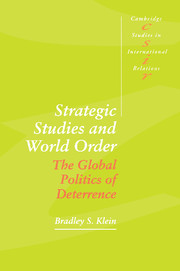5 - DETERRENCE AS A SOCIAL PRACTICE
Published online by Cambridge University Press: 06 July 2010
Summary
… nuclear weapons provide the glue that has held the Western alliance together.
(James Schlesinger)Baudelaire's much-cited essay of 1863, “The Painter of Modern Life,” captures an ambivalence toward order that manifests itself in the tension between production and destruction: “By ‘modernity’ I mean the ephemeral, the fugitive, the contingent, the half of art whose other half is the eternal and the immutable.”
The promise of man's making and remaking the world brings with it a recurrent striving to distance life from tradition. All human achievement, all creativity and vision, finds itself unstable and subject to displacement. Yet for any one particular moment it is art as creativity that prevails in its promise to ensure a new order. The triumphs and durability of the modernist are short-lived, so that in the words of Marx, “all that is solid melts into air.” The momentary achievements of human imagination and culture are rapidly overtaken, displaced and rendered archaic museum pieces by the onward march of progress and modernization. The relentless pursuit of the streamlined – the more rationalistic and efficient – is both an expression of human creativity and a sign of destructive restlessness.
No greater example of creative tension, of imaginative destruction and the promise of rational control, has existed than nuclear weaponry. Indeed, one can argue that the existence and proliferation of these weapons of mass destruction in effect completed the modernist dilemma. In simultaneously offering both the hope of world peace and- the promise of its apocalyptic demise, nuclear weapons have embodied the aesthetic and political antinomies to which Baudelaire referred over a century ago.
- Type
- Chapter
- Information
- Strategic Studies and World OrderThe Global Politics of Deterrence, pp. 106 - 122Publisher: Cambridge University PressPrint publication year: 1994



